
The third and final day of the Missionary Diocese’s Summer Festival at Loimaa Evangelical College began. The most important moment of the week came when the celebrants gathered for a joint Divine Service. The large tent was filled with participants of all ages from all over the country. Bishop Juhana Pohjola and Dean of the Diocese Joel Kerosuo were the liturgists for the celebration. The sermon was delivered by Bishop Emeritus Risto Soramies. The music for the Mass was provided by a music team led by Miikkael Halonen, consisting of a choir and an orchestra.
As in the congregations of the Mission Diocese and in previous Summer Festivals, the Mass began with a solemn procession of the cross with the congregation standing. During the procession, the choir and instrumental group performed a solemn and devotional Hymn of the Atonement. This hymn was composed and arranged by the Rev. Harri Lammi, who is also known as the operational director of the Summer Festival. This was the first time the hymn was heard at the Summer Festival.
Bishop Emeritus Risto Soramies delivered the sermon at the celebratory Mass. This was the 10th Sunday in Pentecost, so the Gospel for the day was the Parable of the Servants entrusted by the master with talents, Matthew 25.
In his sermon, Bishop Soramies said that the word does not refer to our talents or qualities, although the term “talent” is well established in many languages, and then it refers to a natural gift, aptitude or ability. “Talent” refers to all that we have received as a gift from God, the whole of life. It is the vocation we have been put here to fulfill, Bishop Soramies taught.
In the sermon, the Bishop addressed the audience, who are in different situations in life, about taking care of their vocations linked to their life situations. In particular, the Bishop encouraged all listeners to faithfully care for their own vocations. In the Gospel for the day, the third servant did things in a different way from the others, since he did not try to make a profit with his talent, but buried it in the ground. According to Bishop Soramies, this means that he not only did not do too little, but he did not do anything at all. Therefore, we Christians should not neglect our vocations that God has given us.
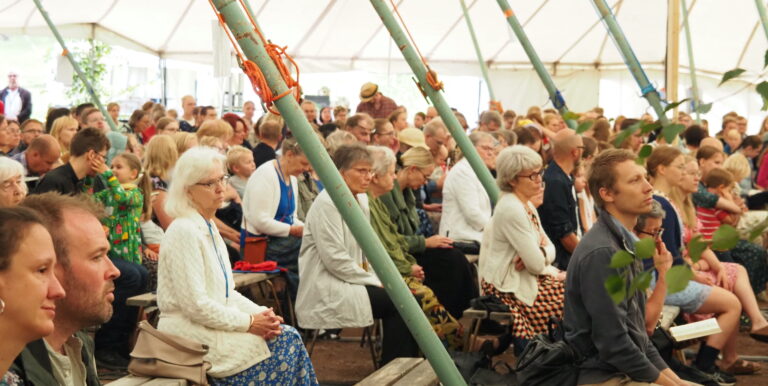
In his sermon, Bishop Risto equipped people in different life situations to live their own vocations. Photo by Juho Pylvänäinen
But the real talent, according to Bishop Risto, is the most Holy Gospel of Christ. “Every Christian has enough of the Gospel at his disposal, and more than enough. He is called to use it in abundance. He who considers himself but a little sinner needs but little of the gospel – one talent, perhaps. Another needs two talents, and a third needs five. The main thing is that each one uses it enough,” stated Bishop Soramies. Remember the gift of this talent, especially when, in the exercise of your vocation, you are confronted with your own sins. “Remember the talent you have received, the treasure that Jesus Himself gave you at your baptism: the most Holy Gospel of what Jesus Christ has done for you. Remember Jesus Christ, the Bishop urged.
After the sermon, the service of Holy Communion began. The celebration ended with the dignified Lutheran hymn 895 “O Canaan land” and the orchestra and choir presenting “Almighty Lord, how wonderful is your name”.
The summer festival continued through Sunday afternoon. Lunch was served after the Mass. In the afternoon, there were closing festivities under the theme “With the Word, sailing against the wind”. The speakers included Bishop Emeritus Matti Väisänen, Bishop Juhana Pohjola, Mission Diocese pastors Sakari Korpinen and Ilkka Pöyry, and the Rev Tapani Simojoki, who serves as a pastor in the Evangelical Lutheran Church of England.
You can see a recording of the celebration here. You can watch the closing event here.
Summer Festival
Loimaa 5 August 2023
Bishop Juhana Pohjola
“You will arise and have pity on Zion; it is the time to favour her; the appointed time has come.” (Psalm 102:14). These words of the Psalm were in mind when the representatives of twenty-five congregations solemnly signed the Charter in Lahti on 16 March 2013. The Finnish Evangelical Lutheran Mission Diocese was born. The moment was not one of defiance but rather of gratitude: The moment of the Lord’s mercy had arrived. We are now celebrating the tenth anniversary of the founding of the Mission Diocese. This milestone was preceded by decades of preparation assembling a confessional front within the Evangelical Lutheran Church of Finland. The fruit of this work was the Luther Foundation Finland, which was established in 1999 and has had a supporting membership in the Swedish Mission Province since 2004 and membership from 2009. In March 2010, Matti Väisänen was ordained in a memorable mass in the Chapel of the Sacred Heart in Helsinki as Bishop of the Swedish and Finnish Mission Province to serve in Finland. The Mission Diocese then continued this work independently under the leadership of Bishop Risto Soramies, who was elected at the inaugural meeting in Lahti.
A generation is defined as a time span of about 30 years. When we look at recent church history here in Finland, we see how in the 1970s, and moving across the boundaries of the traditional “revival movements” and even of the local congregations, the Holy Spirit was calling us to the Word of the Bible and the Lutheran Confessions. This could be called the first generation of the confessional front. It confronted the radicalism that began within the national church in the 1960s [translator’s note: The national church, the Evangelical Lutheran Church of Finland, had a membership of approximately 92% of the population at that time. The Scandinavian Churches are “national churches”.]. This manifested itself in biblical criticism, a submission of the national church to the values of the surrounding society, and pressure to open the apostolic ministry to women contrary to the Lord’s command. Within the infrastructure of the national church, the first generation’s vision was that the church should remain a church faithful to its confessional foundation. The work of the confessional front led to the creation of the Pauline Synod [association] (1976) and the Finnish Theological Institute (1987). Many of the fathers and mothers of the first generation have already joined the rejoicing church.
In the spring of 1998, I first exchanged emails about the establishment of the Luther Foundation with the late Anssi Simojoki. He had discussed the matter with Simo Kiviranta and Sakari Korpinen. The Luther Foundation’s vision of “worshipping communities” was new in church history. This could be termed the second-generation push. The Luther Foundation gathered people from across the divisions between the revival movements from all over Finland. The mainstream, however, continued in the old revival movements, but gradually these worshipping communities were constructed. The second-generation confessional front no longer had access to national church premises, budgets or its office of the ministry. Nonetheless, within the national church we walked the long path of confessing the Seven Marks of the Church: the Word of God; Holy Baptism; the Sacrament of the Altar; the Office of the Keys; the Office of the Ministry; public prayer, praise and thanksgiving to God: and the Sacred Cross. In practice, our pathway within the Evangelical Lutheran Church of Finland came to its conclusion. As a result of the organisation of the Mission Diocese, a number of our pastors ordained in the national church were defrocked and, by decision of the Bishops’ Conference, denied church facilities and membership in the pastoral collegium. We have travelled the journey from a confessional organisation within the national church to having become an independent Lutheran Church in Finland.
In the work of the Luther Foundation and the Missionary Diocese, we will soon have been building together for a generation. What better proof of that than these children, youth and young adults swarming around the festival grounds! We walk, of course, along the longer continuum of the Church in apostolic teaching, in the long train of believers, in worship life and ministry, all the way to the manger of Christ and even the empty tomb. As we in thanksgiving celebrate our tenth anniversary, we remember the generations who laid the foundations of our work, while acknowledging that we are living at a milestone of generational change. Some of those who are here have witnessed with their own eyes two generations of work and change. Others have joined in more recently. The young people are already asking what the third generational spiritual sphere and the Mission Diocese will be like. The important thing is that wherever each of us is on this pathway, we journey with patience, appreciation for each other, in fellowship, all at the same table of grace. Neither in haste nor holding back, but actually walking together!
What is our response as a Church to the question of a third generation mission diocese? The same answer that Peter gave to Jesus in Galilee: “After this many of his disciples turned back and no longer walked with him. And Jesus said to the twelve, ‘Do you want to go away as well?’ Simon Peter answered him ‘Lord, to whom shall we go? You have the words of eternal life; and we have believed, and have come to know, that you are the Holy One of God.’ ” (John 6:66-69)
We in the West are witnessing a historic retreat from the Christian tradition. This is not just a question of institutional religiosity with its national and well-established Churches losing their positions in the face of secularism and individualism. We are reaching the point where the majority churches are imploding into a minority. In England in 2011 60% considered themselves Christian, now 42%. In 1972, 92% of the population belonged to the Church of Sweden, last year 52%. In Finland, where in the 1970s over 90% belonged to the Lutheran national church, now only 65% pay church taxes [The Evangelical Lutheran Church of Finland receives church tax from persons who are members and all legal bodies.]. These curves are rapidly descending. In 2010, 79% of children were baptised; in 2021, the figure was only 54%. The figures for those attending church range from the low digits to the tenths of a percent. We are devolving from being a Christianised homeland, through becoming a secularised welfare society, to arriving at a multicultural and pagan Finland-Finlandia.
As the blue cross on our national flag fades away, the white base colour begins to be filled not only with irreligiosity, but also with neospirituality and, as a result of immigration, with other religions, but then also with multi-faceted Christian traditions. New opportunities are opening up for congregations, which we have already experienced in our work with immigrants. It is difficult to foresee the outcomes of historical change. One clear consequence, however, is a change in the status of professing Christians. The Mission Diocese lives on a mission field. First, as a minority, we have to learn to encounter people who think and live very differently in regard to the Gospel, where the common Christian value base has broken down. How do we preserve our faith without ghettoisation? How do we maintain an interface with our surroundings without being sucked into the societal mainstream? How do we pass on the heritage of faith in our homes? Secondly, we have to see that the image of Christians has largely become negative. At least until the 1980s, Christians were generally regarded as perhaps old-fashioned, but as citizens who represented the backbone of the nation. At the turn of the millennium, Christian truth claims were questioned, but allowed to stand as viewpoints among other perspectives. Today, Christian beliefs and Christians themselves can increasingly be seen as a threat to the common good.
I think that our ongoing case in the Court of Appeals this autumn with Päivi Räsänen, Member of Parliament, makes this quite concrete. As recently as the 1980s, the mainstream would have accepted the basic guidelines of the pamphlet “Male and female He created them”. In 2004, the pamphlet was a criticised but nonetheless accepted as a defence of the Christian view of mankind and of marriage. From 2019 onwards, it is widely regarded as hate speech against sexual minorities. So what are Christians now hearing ever more stridently? This workplace, this company, this educational institution, this media outlet, these rental premises, this family will abide with no hate or discrimination! Get those things out of here! Of course, in our polarised times, there is real discrimination and hatred, and we also want to get rid of those. But in the midst of ideological intolerance and allergy to the Bible, it is worth asking what will replace it when the Christian tradition is abandoned. It is precisely those who cry out against Christians in favour of non-discrimination and equality who forget that these values are not built on the ideas of the French Revolution, the UN declarations, not to mention the ideas of the philosophers of Neo-Marxism, but rather on the conception and value of man as the image of God as revealed in the Bible.
The great retreat also touches upon faith itself and the Churches. The words of Jesus resound over all of Christendom as a great question: Do you also want to go away? Do you also want to go away, and adapt your message and your Church to the spirit of the times? I do not want to paint before you images of horror, but I cannot remain silent about the great deception taking place before our eyes all over the world. This is not, in essence, a cultural revolution, an ideology or about sexual ethics, but it is a spiritual issue and a battle of spiritual powers: Who is God? Who is man? What is the Gospel? We can give this spiritual apostasy different names. For example, we can take from the pages of church history the title neo-Gnosticism. With this new knowledge, the gnosis, a new language, a new conception of reality, a new moral yardstick, people are then divided into groups, reactionary and progressive. This is a perversion of God’s good order of creation, His will of revelation and His saving gospel.
Drunk on their own progressiveness, the wealthy churches of the West are pushing this, even as the the pews of cathedrals are filled with emptiness – and soon their coffers too. Church after Church is divided over the rainbow flag. The latest example is the division of a large Methodist Church body in the United States this spring. A deep rift in the Anglican world was exposed in April in Rwanda when the Global Fellowship of Confessing Anglicans decided to establish new alternative dioceses for homeless members in Europe. The meeting called on the Church of England and its Archbishop of Canterbury to repent of its rainbow policies, which are not only contrary to the order of creation but jeopardise human salvation (1 Corinthians 6:9). In Germany, the Bishops’ Conference of the Roman Catholic Church is promoting same-sex marriage and gender ideology right under the Pope’s nose. The Lutheran World Federation promotes a rainbow agenda in its member churches, while the member churches of the smaller but growing International Lutheran Council adhere to both natural law and biblical revelation. The same cultural pressure is spreading to Eastern Europe, where the Orthodox world is once again paralysed, but for another reason. The Patriarch of Moscow rightly rejects the gender movement that has enraptured the West, but falls into yet another ditch: blind nationalist power struggles and the preservation of the Church’s temporal interests in alliance with a state power that tramples on human dignity and fundamental rights. This is another danger Christians face when societies become politically polarised. If Israel flees from a corrupt Babylon and relies rather on the power of Egypt than the arm of the Lord, she will suffer!
In this shifting of the spiritual continental tectonic plates, we must observe a great spiritual division in Finland. We belong to those minorities who adhere to classical Christianity and who seek practical answers: “Lord, to whom shall we go when the world around us and the Churches have become fully estranged from your hand?”
We in the Mission Diocese are not indifferent to the developments within the Christian sphere in our country. Because for us it has never been just about the Mission Diocese, but about how to preserve our holy faith and the Lutheran congregations as broadly as possible for the next generations. This issue is how as many as possible can be saved in this country too! Thank God, we by no means labour alone in this work! I know that there are still many in the national church who are quietly doing valuable work, albeit being under constant pressure to conform. Our calling is to seek communion on the basis of the Lutheran Confessions wherever we can. What a joy it has been to build a relationship with a 100-year-old Lutheran Church here in Finland, the Lutheran Alliance of Congregations. God willing, this communion of faith and doctrine will be formally recognized in the coming year. Beyond that, let our dialogue continue with those revival movements that still seek to be faithful to the Bible within the national church.
Cultural change and pressure from the national church are also visible in these movements, that is, by pulling them closer together. Lauri Vartiainen, Executive Director of the Finnish Bible College, said in the spring: “If the trend continues like this, the Finnish revival movements will scarcely be in the national church in after ten years.” Even if this would not be the goal of the movements, in both the national church and the movements themselves, the changes are rapid. On the one hand, the arena where activities can take place is becoming more cramped: the doors of the national church are being closed, pastors are not being ordained, the spigot of mission funds coming from the national church congregations is being shut off, and then, as well, theological divisions are growing. On the other hand, according to Vartiainen, the “divine service communities” [still not congregations, but providing the Mass] are the only growing form of activity in the revival movements. In an accelerating wave, a significant proportion of people have already left the national church in protest over its direction or because it is spiritually irrelevant to them. Thus, leaving the national church is not based on a collective decision of revival movement leaders from above, but a gradual process occurring at the grassroots level. This is not a massive march out, but a steady erosion. Young adults do not experience the same kind of connectivity with the national church as do previous generations. The problem is that a growing number of young Christians live without any church membership, although they may attend meetings of various organisations. Despite its valuable heritage, the old revival movement model simply no longer fully responds to the altered circumstances and the needs of the third generation. Actually, a situation in Christianity where the people are not church members and not congregation members as well is not in accord with the New Testament or, thus, the Lutheran Confessions. Jesus promised and intended for a better situation to prevail!
What does this mean for us? Thanks be to God, despite all our weaknesses and shortcomings, we have congregations and a church to live in, to be members of and to be a place to invite others. Hopefully, in this way we can also set an encouraging example that congregations are essential to the life of faith, that they can grow and that as a church we can live apart from the confines of the national church. Our third generation will build our future church without a constant, consuming internal struggle over the directions of the national church. With the third generation, the last ties to the national church, where many of our people have a dual membership, will in time be severed. Whether it makes sense for us in the future to register as a “religious community” [the term for an official registered church body in Finnish] is an open question. Under God’s leading, here, too, we will together find a solution. I hope that at some point in the future the possibility will also open up for an informed relationship with the Evangelical Lutheran Church of Finland, despite our major differences. Increasingly, the frame of reference for the third generation is global and confessional Lutheranism with the member churches of the International Lutheran Council, just as many young adults and university students experienced in practice this summer at the international Corpus Christi event.
If the Finnish revival movements are not satisfied with an abridged core of the gospel and do not just seek a living space in a multi-faith rainbow church, them they will truly find their answers in congregational-type divine service communities. Then they will have a need for ordinations and spiritual shepherding, and an economically, theologically and functionally independent relationship with the national church. In such a situation, will the revival movements and the Mission Diocese not have more opportunities in the future to find common ground? Young adults, is this not a common vision and prayer challenge for the third generation!
Simon Peter answered him, “Lord, to whom shall we go? You have the words of eternal life; and we have believed, and have come to know, that you are the Holy One of God.” (John 6:68-69) Peter looks sideways along the shores of Galilee. To his left the excited faces in the crowd are twisted into a grimace of disappointment. On the right, there is confusion at the offensive words about the eating of Jesus’ body. This then turns to a sorrowful uncertainty. One by one, the crowd turn their backs and walk away. At Jesus’ question the enthusiasm of the large crowd shrinks to a small remnant: “Do you also want to go away!?”
Did you notice? Jesus stops, takes his time and asks. He doesn’t blame people or force them: “Surely after all you have received, you will stay with me. You should understand, shouldn’t you?” No, He doesn’t do that. He asks a question. “Why?” Because you can only be with Him out of freedom, not compulsion. Jesus does not force anyone to stay with him. Jesus asks because he wants his disciples to internalise for themselves the meaning and cost of following him. Jesus wants to listen to what the disciples timidly have to say. Only in freedom can there be a personal conviction that can weather the storms. It is in this space of freedom without coercion that we too live. If Jesus asks, listens and discusses, can we not do the same? This is highlighted in our homes as our young people live in the growing tension between the tradition of faith in the home and the surrounding world of school and media. This is reflected in the reality that the third generation faces. After all, our Church represents a minority culture that is alien and downright frightening to many. For people to have the opportunity to come and find their place, they must have the time, space and safety to question and to explore.
As a Church, we remain united when we discuss together. And in order to discuss together, we need time in our congregations together. This is true in our families and in the family of God! For our part, let us each nurture this discussion!
What does Peter say? “Lord, to whom shall we go?” Lord, to whom shall we go when we can no longer go to Mass in our home parish? To whom shall we go when we want to live and rear our children in our congregations? When I want to bring my friends to you? When my own heart is empty and in place of false slogans I thirst for the truth?
Where will we go? “You have the words of eternal life; and we have believed, and have come to know, that you are the Holy One of God!” What was the motto recorded at the founding of the Mission Diocese? It is found on our coat of arms. Scriptura sacra ius nostrum divinum: Scripture is our divine right. What other could this motto mean than Peter’s confession: “You have the words of eternal life” We hold fast to the promises of Your word because in those words we hear Your voice. No one has the right to abridge them or take them away from us! Your words do not only tell of the Most High. Your words are not impulses to mercy, nor cushions for safe spaces. Your words are not a swamp dragging us down to drown in ambiguity. Your holy, clear and sure words reveal my shocking blindness and my state of damnation, but yet they bestow upon me eternal life! We believe and we understand that in and through them You, the Most Holy God, speak and act.
You, Jesus, are the Holy One of God. Yours is the Holy Bible in its entirety. Yours is Holy Baptism. Yours is Holy Communion. Yours is the Holy Mass. Yours is the Pastoral Office. Yours is the Holy Christian Church. In these are the words of eternal life for our souls and our bodies. This is what Peter’s confession means. This is the confession of our fathers and mothers and it is ours too. May the Lord grant that it will also be the confession of future generations!
We still want to hold on to these holy gifts of eternal life. What can we take away from them, what can we add to them! This is not a matter of preserving the heritage of the fathers, nor narrow-mindedly staring into the rearview mirror. No, this is living in Christ.
So we are not programmatically fighting a culture war or dismantling the national church, but confessing Jesus. We have been positioned in this time to confront, as Christians, the issues at the crest of the wave. We find the answers in the natural law, in the Bible and its Lord. It is important to see that in bringing salvation, Jesus also affirms and redeems the order and the value of creation. We acknowledge that Jesus, the true God, is the true man with a body and soul that cannot and must not be rendered asunder, even if the whole world prefers the emotional feelings of their own mind over the biological facts of sex. We confess with the angel’s testimony to Mary that “the child to be born will be called holy – the Son of God.” (Luke 1:35) Therefore, every human life is unique and precious. Life already begins in the womb and it must not be forcibly terminated. We confess Jesus, Who, in great pain, cried out on the cross, “Into your hands I commit my spirit” (Luke 23:46), even if the forces in our country would push for the so-called right to euthanasia and to choose one’s own death. We acknowledge that the Christian church is the bride of Christ. Paul writes of marriage, “This mystery is profound, and I am saying it refers to Christ and the church.” (Ephesians 5:32) Therefore, marriage is and remains a union of one man and one woman as a security for each other and for their children. It is to this incarnate Christ, to this incarnate faith and church body that we anchor ourselves! To acknowledge this gift of the body, to see the gift of life and the value of one’s own body, to rejoice in the gift of sex, to give oneself to God unmarried, to dare to marry and have children… All of this we encourage. This is the positive response of the third generation, whose counter-culturalism shines ever brighter.
Those who turn their backs on these life-giving and life-protecting truths turn their backs on Jesus. You cannot serve two masters! And at the same time we confess that the issue in this broken world is not just doctrines, but tangible, confused, wounded and truly distressed people around us. Lord, give us the grace to speak with your voice and look with your gentle eyes on each of those closest to us without distinction! Look to us who, in the brokenness of life, find ourselves or our loved ones at a loss over these matters. Lord to whom shall we go, for only You have unconditional mercy and unending love! Lord, have mercy on us all!
I recently learned an old Finnish word that was used for the then new product we now know as perfume [in current Finnish: hajuvesi, literally: scented water]. What do you think of the word sulolemu [literally in English: a sweet stench]? Wouldn’t men love to give their wives an expensive bottle of that “sweet stench” stuff next Christmas! I don’t know how eager the ladies would be to spread that particular “sweet stench” around them! But Christians are like this: some wrinkle their noses at the stench, others smell of heaven. What does Paul write? “For we are the aroma of Christ to God among those who are being saved and among those who are perishing, to one a fragrance from death to death, to the other a fragrance from life to life.” (2 Cor 2:15-17) Young people, the youth before me, may you be the generation of the “sweet stench”!
In the ten-year long journey of the Mission Diocese, we have already encountered many difficult situations and questions. But we have never had to think about one specific topic. Do we have room to live in? Is there still room for our activities? We have lived in a spacious place! (Ps 18:19) We have had as much space as the whole of Finland, not to mention foreign missions! The only limitations have been found in ourselves and in our calendars. These things also apply to the third generation. The field is open! There is room! There is abundant grace! The Holy Spirit equips us! Even today, heaven is open to all! In 13 years we grew from one congregation to 25, and in the next 10 years from 25 to 42 congregations. Ask the Lord for even more! As our activities are based on, no, they depend only on, the eternal life of Christ, we will always have room for operations. But there is always a price to pay for confessing Jesus, and that is where we are tested in our daily lives. But even if He takes you into a narrow place, he makes it wide open, spacious. For who would have the power to drive our Lord into a corner or to deprive him of possibilities for action? That is why shutting up, retreating and complaining are not options for us.
At the time the charges for the crime of agitation against an ethnic group were brought against me in the District Court, I came across an article about the Greek word parrhesia. It means to tell the truth openly, publicly and boldly, particularly when it differs from the majority opinion. The author pointed out that in a world of increasing censorship and speech police, the Church is by its very nature a movement for freedom of expression. The book of Acts tells how Peter and John were arrested by the chief priests. They took them to court and forbade them to speak. Do you remember what the apostles upon being sprung from prison prayed with the church? When they were told to be silent. When they were seen as a threat to the common good. When it seemed that the road for the spreading of the church was completely blocked off. Did they pray, “Lord, give us a little cubbyhole to retreat to in peace? Lord, spare us from trouble. Lord give us justice and opportunities for activities.” They well may have prayed all those things. But what did Peter and the church ask: “And now, Lord, look upon their threats and grant to your servants to speak your word with all boldness.” (Acts 4:29) Lord, give us parrhesia, grant us with all boldness to speak your word. For, Lord, you alone have the words of eternal life. Only in Your word do we have the Holy Spirit, our Advocate. Only by Your word can we live, die and stand at judgment!
Dear friends here at this summer festival – and the third generation of the Mission Diocese: with all boldness as a Church, let us proclaim the word of the Lord in this time and in this land! With all boldness let us live by the grace of Christ. With all courage and resilience, let us build congregations to be homes for ourselves, for the next generation, for those who are seeking and those who are not yet seeking. With all courage, let us also dare to reach out and listen to those who think differently than we do about faith and life. This is what I pray for our Church as the third generation matures and takes responsibility for our congregations. This courage does not just mean shouting on social media or making loud statements in the workplace, but above all it means we become so weak that we cannot live without the words of Christ’s life. We have different callings, but all of us share the same promise of Hebrews which Simo Kiviranta, the founding father of the Luther Foundation, chose as the text of his own death announcement: “We have confidence / full rights / courage / parrhesia to enter the Most Holy Place by the blood of Jesus.” (Heb 10:19) The right and courage given by the atoning blood of Jesus carries us through!
I watched a documentary about Nicholas Winton. Who was he? He was an English businessman who went on holiday to visit a friend in Prague in December 1938. Surprisingly, he ended up running a project especially to take Jewish children to safety from before the approaching Nazi army. The only problem was that in order to get a child out of Prague by train, he or she had to have a foster home in England. So, Winton photographed the children and presented the catalogue of photos in the English papers: Would anyone want to take one of these children into their home? Those who were chosen were offered a place on a train. A cross was drawn over the picture of these children in the file. The parents of each child marked with a cross put them on a train at the Prague station, leaving them, fully knowing they would surely never see them again. Of the thousands of children, only 669 reached safety before the war spread to Poland and all the borders were closed in September 1939. Of the Jewish children who remained in Prague, only a handful survived the horrors of the Holocaust.
Even today we see heart-rendering images of children fleeing war and war orphans in both Russia and Ukraine. This time and chain of events is not so far away from us either. My own father, with a name tag around his neck, was transported to Sweden as a war child to escape the bombing and threat of occupation in Helsinki. Outwardly, he was safe, but internally he was sorely separated from his parents. And on top of everything he was placed in a different family from his brother. Watching this documentary myself, I was left wondering how people would have reacted to my picture in a newspaper. Would I have been accepted into a home or would I have had to say: Do you want to go away too?
Dear friends, our greatest challenge is not how this culture around us will become more negative or how churches will be divided in the midst of deception. No, ultimately our main question is this: Jesus, do you want to go away from all of this! Will you withdraw from me after seeing everything about me and my life? But what does Jesus say to you? With what does he assure you today? I will not withdraw. I do not want to leave you. I will not leave you. I have marked you with my cross. I have marked you with the sign of my cross. You are my baptised child. You belong to my church family. Friend, do you hear: there is not one orphan, not one abandoned, not one forgotten, but all are children of the Heavenly Father’s mercy! You are a beloved child of the Father!
This is our security and hope, this is the certainty and spaciousness which past generations and future generations have to live by. It is by this that the Mission Diocese lives as part of Christ’s worldwide church. To this communion of grace we invite others.
Thank you Lord Jesus, you Holy One of God, you are my life and my eternity!
You can watch the lecture in the YouTube window below.
The 68th Conventionof the Lutheran Church Missouri Synod (LCMS), a confessional Lutheran church in America, was held 29 July – 3 August 2023, in Milwaukee, Wisconsin. In their meeting every three years, the Convention elects persons to leadership and stewardship positions in the Church and decides on the common affairs of the Church. The canonical hours, Bible studies and catechetical moments punctuated the intense days of the meeting. The overall theme of this year’s meeting was: “We proclaim Christ crucified” (1 Cor 1:18-25). Nearly 3,000 Convention delegates, expert members, volunteers and invited guests gathered in the conference center. Over forty international guests from sister churches of the LCMS were invited to attend.
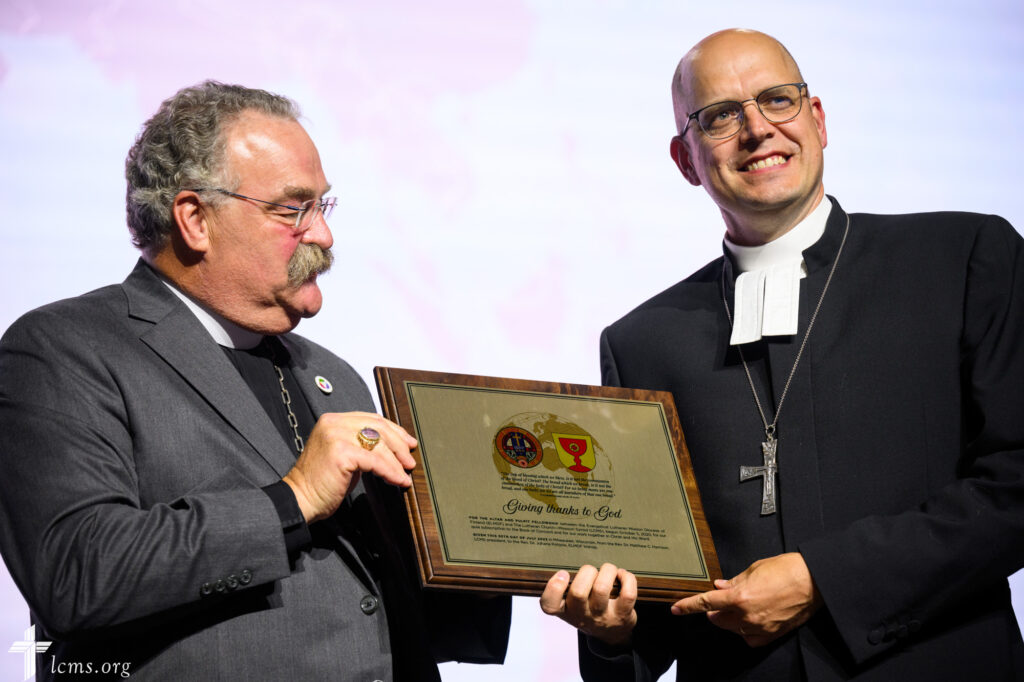
Bishop Juhana Pohjola and Missouri Synod President Matthew C. Harrison after the affirmation of ecclesial fellowship. Photo by LCMS Communications/Erik M. Lunsford
The agenda of the meeting included the strengthening of the ecclesial relationship with the Finnish Evangelical Lutheran Mission Diocese. On Sunday 30 July, by a unanimous vote, the delegates approved the ecclesial fellowship agreement signed by President Matthew Harrison in 2020. Following the decision, the thousand-strong assembly stood and sang a Doxology to God. In his speech, Bishop Juhana Pohjola stressed how the mutual recognition of ecclesial communion is a good gift from God:
What a gift it is to proclaim Christ crucified together and to come together in faith to the same communion table. What a gift it is to support one another in prayer in the work of the Gospel and in the midst of difficulties. What a gift that we are sisters and brothers in Christ Jesus!
The Council also recognized ecclesial fellowship with Lutheran churches in South Sudan, Uganda, Ukraine and Sri Lanka.
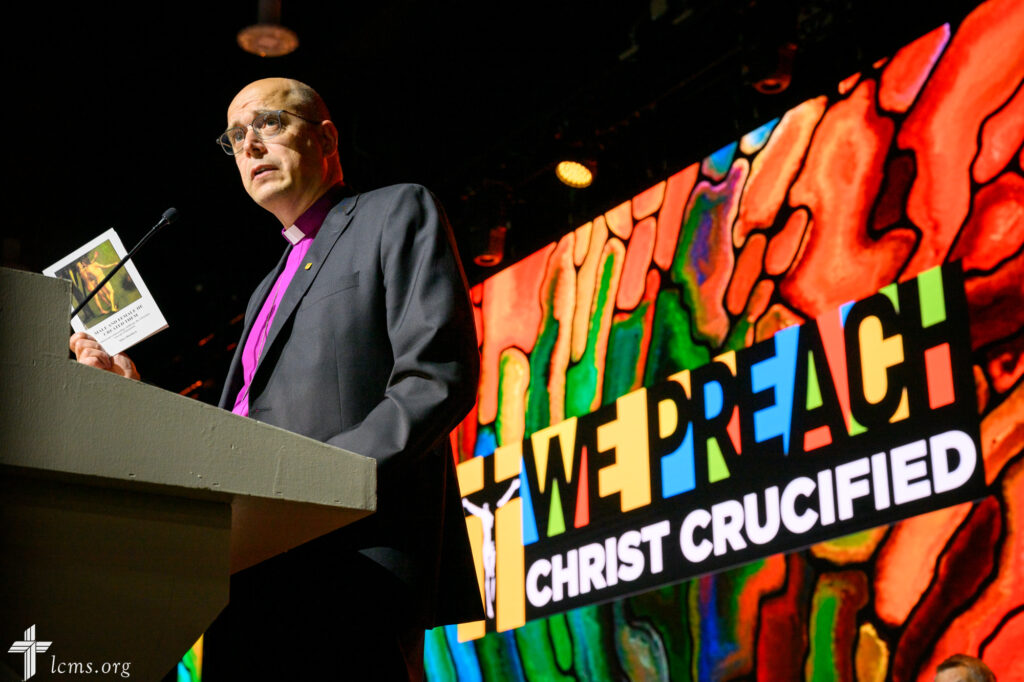
Bishop Juhana Pohjola speaks at the Missouri Synod Assembly on 1 August 2023. Photo: LCMS Communications/Erik M. Lunsford
Päivi Räsänen, Member of Parliament, and Bishop Juhana had been asked to tell the Convention about their court case concerning freedom of speech and religion. They were invited to share their first-hand experience and thoughts on the case. The encouragement and support in the convention hall was moving. The judicial process has generated a lot of interest and compassion, which is reflected in the many requests for interviews and hallway discussions. Many LCMS congregations have prayed for the case and for the Missionary Diocese.
Bishop Juhana was also invited to give one of the keynote lectures on the theme of the conference, We proclaim Christ – the redemption of the world.
Further reading:
Missouri Synod Convention pages
News of the establishment of ecclesial fellowship with the Missouri Synod at the 2020 Diocesan Assembly of the Diocese of the Missionary Diocese
On 1 February 2023, the Parliament of Finland passed the Gender* Confirmation Act (the so-called Trans Act) by a vote of 113-69. The adopted Trans Act allows every adult Finn to change their legal gender on the basis of a simple self-declaration. No external agency or control, such as medical doctors or psychiatrists, is required for legal gender/sex reassignment.
Correct principles underlie the adoption of the law. Individual rights are inalienable in a free democratic society. Adult human beings are to be allowed to make decisions about their own lives as individuals, even when others think these conclusions incorrect and even problematic. It is also important that every person is respected, regardless of their life choices.
However, there is much more involved in the acceptance of this law. It is not just a matter of a marginalised group seeking a recognised space in society to live in their own way, or availing themselves of the right of self-determination provided by law in order to change their legal gender. At the communal level this law instructs and on a societal level it shapes a new understanding of the human person. By adopting the law, a small minority has kidnapped the majority, transporting them into its own ideological frame of reference. Even if trans issues do not concern us or we have no interest in the LBTQ movement, nonetheless, we are all told to accept as the point of departure the definition of humanity itself issued by an ideological group. The entire nation is thus directed to march after the rainbow flag. Pervonormativity has become the new normal. It has descended the front steps of the Parliament of Finland and pervaded every part of society.
The trans law is just another step on the road to the sexual revolution. Its aim has been to liberate humanity from all sexual morality in the name of individual freedom and human rights, and to alter the concept of humankind, the meaning and purpose of life. There is no innate natural law and no order created by God. There is no human dignity based on conception. There is no biological basis for two different, equal and complementary sexes. There is no permanent bond and sacred marriage between one man and one woman. There is no marriage to be awaited where in security, fidelity and love the gift of sexual life may be received. There is no family of father, mother and children.
Parliament passed a gender-neutral marriage law in 2017, extending marriage to same-sex couples. This decoupled marriage from natural law and biological lineage, as only marriage between a man and a woman is, in principle, open to receiving children and affording the only real security for all family members.
The trans law adopted in 2023 continues to break down the biological fact and the common conviction of humanity that people are born either boys or girls, and this is also reflected in their external features and genitalia. Rare developmental disorders (intersexism) do not destroy this rule but, on the contrary, confirm its veracity.
This trans law, now approved, directs Finns to accept a new concept of the human person. According to the law, it is natural, healthy and acceptable that a person’s body, soul and mind can be torn apart. Although one’s body is male or female, if a person’s mind, emotions and experience relate a different story, that then narrative is decisive. This self-defined gender should be approved and acknowledged by all. But can it ever be good for a person, a psychophysical entity, to set body and mind against each other? Nevertheless, contrary to our experience and to the biological facts, not to mention the Christian concept of humanity, according to this law, our language and speech must be forced to bow down to recognise gender/sex multiplicity and mutability. What consequences will the law have for freedom of expression?
This trans law is individualism and idealism taken to the extreme, where spirit overrides material reality. In the history of theology, this heretical movement which denigrates the physical and the material was called Gnosticism. Unfortunately, the new trans law has a similar underlying tone of contempt for the human body. There is no respect for the body in which the soul and mind reside.
Although the law does not apply to minors, at least not yet, it also sends them the message that human gender/sex is a completely subjective matter. Not even any physical factors are necessarily relevant to gender; it is up to the individual to decide whether he or she is a girl, a boy or some other gender. The legislation thus further reinforces gender dysphoria, which, via public discussion, has exploded in the 21st century. Adolescent girls are particularly vulnerable to being swayed by public opinion, their peer groups and social discussion on these issues. Far from supporting these girls’ development and their establishment of a stable sexual identity, the new legislation makes this even more difficult.
This new legislation is based on the idea that there is no given or permanent gender identity. They must create and shape who they want to be. The burden of this task drives many growing young people into an intolerable state of uncertainty and exposes them to mental health problems.
This law has been adopted. But nothing good will come from the concept of humanity represented by the law. Its foundations are alien and false to reality. This path of apparent freedom will only lead to greater ill. Like other revolutions, this one will also eat its own children. Sadly, it is children and women who will suffer most.
As Christians, we know that the authorities are to be respected because all authority derives from God. However, there are limits to sovereignty. As Christian citizens, we can never accept the concept of humanity exemplified in the new trans law passed by a small majority in Parliament.
All Christians must continue to see themselves and their fellow human beings as precious and unique human beings created by God, either as men or women. There are no other genders and biological sex cannot be changed. Sex is a given gift, and it is good. We ourselves may rejoice in our bodies and souls. We may teach and guide others to see the oneness of body and mind, even when it can be confusing and difficult, for example, as those struggling with anorexia or gender dysphoria are acutely aware of.
This change in legislation further increases the need for Christian churches to hold before the public the natural law and the biblical view of humanity, to teach these patiently and to consistently act upon them. We must also be prepared to pay the price for confessing the Christian faith and understanding of humanity.
We all need Christ’s help and mercy in this call. May we continue to learn to encounter those who think differently in truth and love. Let us pray for our country and our people. Above all, even in the midst of our own sexual brokenness and all of our failures, may we remain in the merciful hands of Christ.
Come unto me, all you who are weary and burdened, and I will give you rest. (Matthew 11:28).
For you created my inmost being; you knit me together in my mother’s womb. I praise you because I am fearfully and wonderfully made; your works are wonderful, I know that full well. (Psalm 139:13-14)
“I believe in God the Father Almighty, Creator of heaven and earth.”
What is this?
I believe that God has created me together will all that exists. God has given me and still preserves my body and soul: eyes, ears, and all limbs and senses; reason and all mental faculties. In addition, God daily and abundantly provides shoes and clothing, food and drink, house and farm, wife and children… The Small Catechism
Bishop Juhana Pohjola, ThD
*[translator’s note: In Finnish, basically the terms “sex” and “gender” are the same word, “sukupuoli”.]
State Prosecutor Anu Mantila and Regional Prosecutor Maija Päivinen today, 29 April 2022, submitted to the Helsinki Appellate Court an application for further proceedings and an appeal against the acquittal of the Helsinki District Court in the so-called “Bible trial”. The prosecutors demand the annulment of the District Court decision and the conviction of Päivi Räsänen and Juhana Pohjola for incitement against an ethnic group and the imposition of a corporate fine on the Luther Foundation Finland. [Finnish law allows for prosecutors to appeal verdicts of the acquitted.]
The prosecution argues that Päivi Räsänen’s writing Male and female He created them, her tweet about the Pride parade and her discussion on Ruben Stiller’s radio programme constitute incitement against a group of people. Thus far, the police concluded in a preliminary investigation that the booklet does not violate the law, and most recently the District Court came to the same conclusion.
Charges have attracted widespread attention
The charges have attracted national and international attention as they have been assessed to endanger freedom of speech and religion. The legality of the charges has also been questioned. After the District Court’s decision, Yleisradio [Finnish Broadcasting Corporation] published a news item: “Prosecutor placed words into Päivi Räsänen’s mouth she had not said – YLE goes through the false allegations.” In a later YLE news item, State Prosecutor Anu Mantila expressed her dissatisfaction with the verdict, stating it was the prosecutor’s duty to explain the meaning of Päivi Räsänen’s statements, i.e. how the statements should be interpreted objectively: “Prosecutor denies misrepresenting Päivi Räsänen’s statements – slams acquittal and explains differences in interpretation with a horse analogy.”
Bishop Juhana Pohjola comments on the prosecutor’s appeal
– “The prosecutor’s appeal to the Appellate Court was not surprising, even though it is regrettable. The goal is to obtain the Appellate Court interpretation of the law in relation to the fundamental rights of freedom of expression, freedom of religion and equality. I am confident that the charges that were unanimously and justifiably overturned by the District Court will also be overturned in further courts.”
– “It is worrisome the prosecution is thus continuing its ideological campaign to deprive Christians of the right to publicly teach the Christian concept of man and of marriage based on natural law and the Bible. Although our booklet [above] emphasizes the indivisible human dignity of every human being based on creation and redemption, the prosecutor claims that our booklet is discriminatory and homophobic because it rejects homosexual acts. According to the prosecutor, it is an affront to human dignity to criticize a person’s homosexual lifestyle as wrong and as a moral choice taken against God’s will. This is an attempt to criminalize Christian sexual teaching and, ultimately, the proclamation of sin – and the gospel of the grace of Christ.”
– “This long and arduous process will continue, but I am sure that the work for freedom of speech and religion will be meaningful and beneficial to all in our society. I also know that we go forward in God’s good hands and according to His plan.”
Bishop Juhana Pohjola’s lawyer Jyrki Anttinen remarked on the prosecutor’s appeal
– “In their appeal, the prosecutors do not really present anything new, but justify their charges with the same evidence and arguments as they had in the District Court. If the Appellate Court grants the right to continue the case, the defendants will be asked to answer the charges, after which we will see, in due course, what kind of evidence the Appellate Court will use to decide the case.”
The Helsinki District Court clearly dismissed all charges of incitement against Päivi Räsänen, myself, and the Luther Foundation Finland. The nearly three-year long process has at least reached an interim conclusion. My mood has been one of relief and gratitude. In Finland this is the first time there has been this type of trial, where deliberation was made of criminal liability for religious communication and teaching. The case has also attracted enormous international attention. In the midst of all the uproar, I stopped to think, what can I be thankful to God for?
I thank the Lord that, despite all my faults and failings, I can still live today as a child of grace.
How great it is to be blessed, declared innocent for the sake of the blood of Christ shed on the cross!
“My soul, praise the Lord, and everything in me, praise His holy name. My soul, praise the Lord, and don’t forget all the good He does.” Psalm 103 (AAT)
Bishop Juhana Pohjola
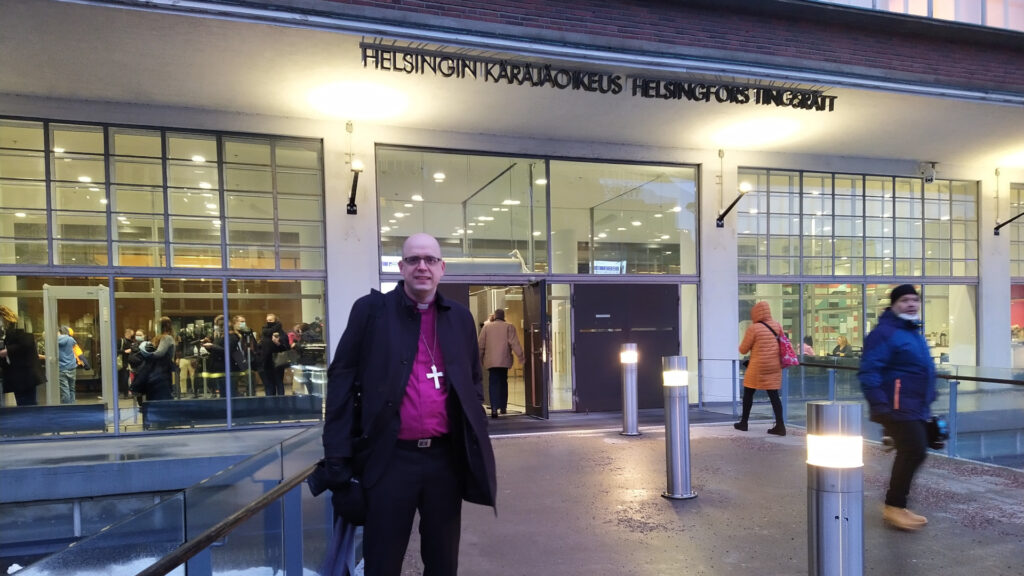
Bishop Juhana Pohjola in front of the Helsinki District Court on 24 January 2022.
Helsinki District Court issued a decision on 30 March 2022 at 1:00pm regarding the charges of incitement against a group of people, “hate speech”, brought against Päivi Räsänen, Member of Parliament, and Bishop Juhana Pohjola. The three-judge panel unanimously delivered a judgment of acquittal and dismissed all charges.
– “The District Court’s decision was to be expected. This is not only a victory for us, but for freedom of speech and religion in Finland and beyond. In seeking to criminalize Christian teachings on sexuality, the prosecution cast a shadow of fear over society. It was important to receive a strong signal from the District Court defending our fundamental rights as citizens and Christians. It was essential we heard from the court that we have not committed a crime of incitement, because we have always denounced defamatory speech. On the contrary, we have taught the concept of humanity and marriage in accord with natural law and the Bible. This is what we have taught and will always preach as a Church, both in private and in public. While I rejoice over this decision, I nonetheless find it problematic that in its deliberations the District Court considered Päivi Räsänen’s booklet “Male and female He created them” to contain offensive speech, even though it does not consider that Räsänen’s writing was denigrative as outlined in the intentions of the Criminal Code,” Pohjola commented on the decision.
Helsinki District Court heard the prosecution’s case against Dr. Räsänen and the Rev. Dr. Pohjola in two hearings, 24 January and 14 February 2022. Bishop Pohjola was charged as editor-in-chief responsible for the publication and distribution of the booklet Räsänen wrote “Male and female He created them”. According to the prosecutor, the pamphlet denigrated and defamed homosexuals. The prosecutor had demanded 60 day-fines for Pohjola and a EUR 10,000 corporate fine for Luther Foundation Finland.
Bishop Pohjola’s lawyer Jyrki Anttinen commented on the District Court’s decision:
– “The case was decided on the basis of an assessment of the evidence, taking into account the background and context of the writing. The booklet was not written to insult or defame, but to defend a religious view of marriage. The District Court held that the quotations were not in themselves disputed, but that they could not, in a broad sense, be interpreted to the detriment of Päivi Räsänen.
The District Court held that passages from the writing could be considered offensive, but were not of such severity as to violate the equality or dignity of homosexuals or to arouse contempt or hatred. Thus, Päivi Räsänen’s writing did not insult homosexuals and Juhana Pohjola was not guilty of criminal conduct. The claim for punishment against the Luther Foundation must also be dismissed.
The rationale in the District Court’s decision must be examined in more detail, but in principle I do not entirely agree with the District Court on the general offensiveness of the passages in the writings in the indictment.”
The Bible trials have received a lot of attention both at home and abroad. There have been many expressions of support, both privately and publicly, throughout the process.
– “I would like to thank all of those who have provided support and encouragement during this long process. There has been a tremendous outpouring of intercession from all around the world. Ultimately, this a spiritual battle and a matter concerning the Gospel of Christ,” continued Pohjola.
The prosecutor has the possibility to appeal the decision to the Appellate Court, so the decision of the District Court is not yet final.
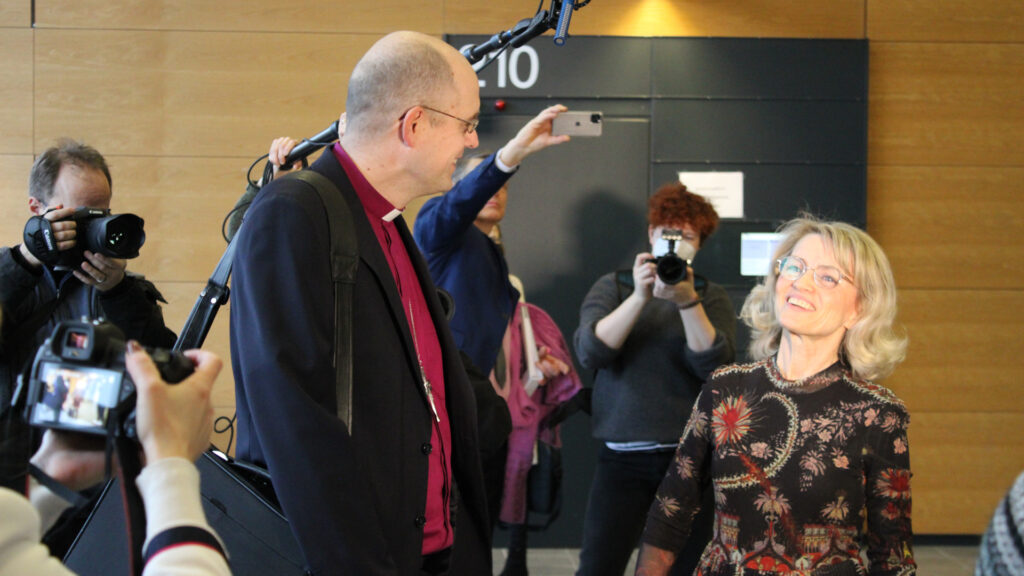
Juhana Pohjola and Päivi Räsänen before the start of the trial
14 February 2022
Today, the “Bible Tribunals” continued in Helsinki District Court. On this second day, the prosecutor and the legal advisors of the defendants, Päivi Räsänen and Juhana Pohjola, gave their closing statements. The length of each closing statement was limited to one hour, so this time the court session was clearly shorter than the first.
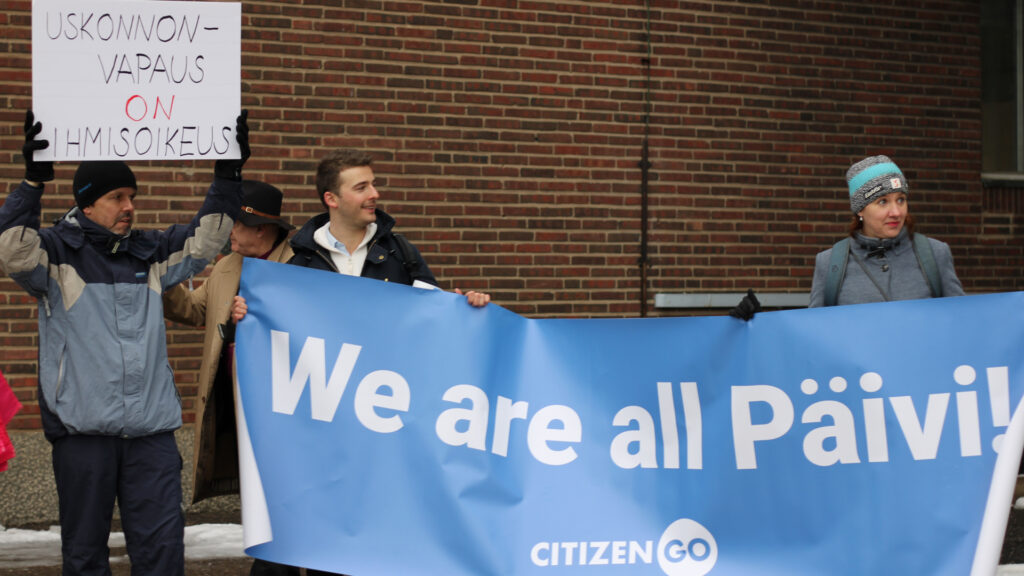
Representatives of the NGO CitizenGo came from at least Spain, Slovakia and Hungary to express their support.
Compared to the first day of court, there were fewer representatives of the domestic media, but the foreign media was even larger. In fact, there was live international coverage from the yard of the District Court. Representatives of CitizenGO, an international free speech organization, were also present to demonstrate and report on the trial. Before it started, Pastor Andrew Brunson, and his wife Norine, handed Päivi an international address of support containing 14,341 pledges of prayer support. [link]
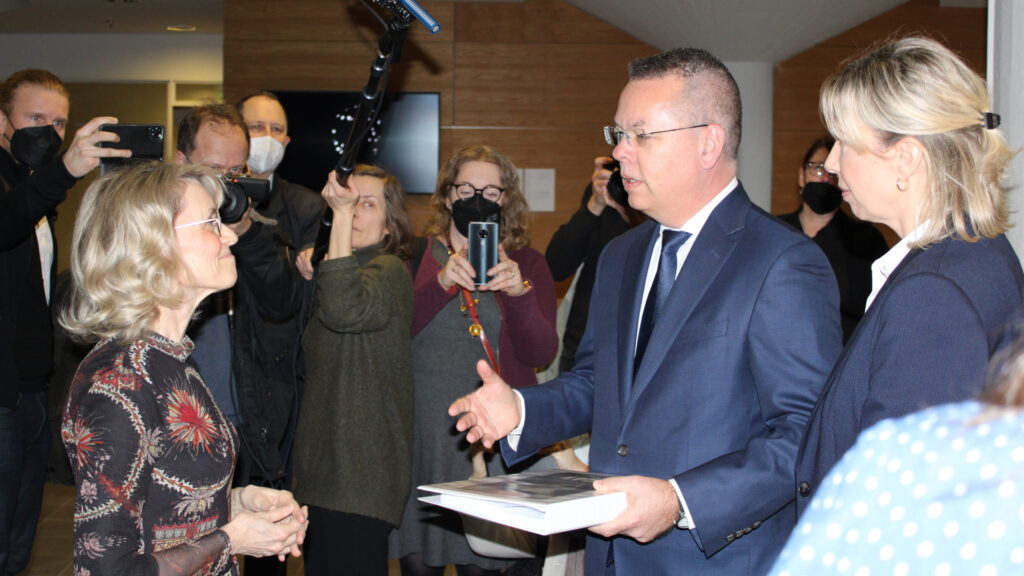
Päivi Räsänen receives an international address of support.
Once again, there was a demonstration in front of the District Court, showing support not only for Päivi and Juhana, but also for the broad freedom of speech and religion. Juhana and Päivi both greeted the demonstrators by megaphone, thanking them for their support and encouraging them to continue to promote these freedoms.
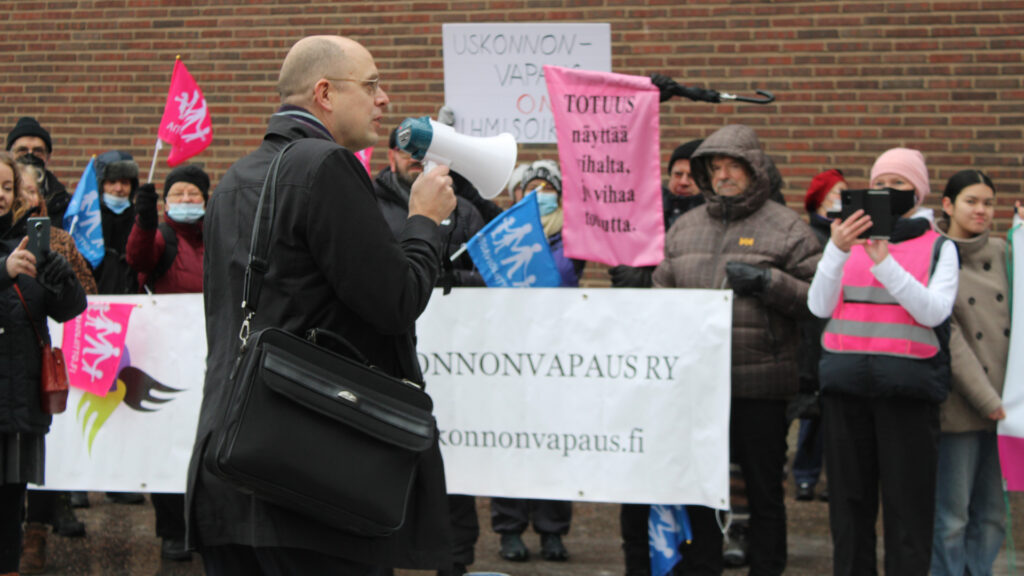
Bishop Juhana Pohjola addresses protesters.
Growing concern over freedom of speech and religion
State Prosecutor Anu Mantila delivered the prosecutor’s final arguments. Maija Päivinen, the District Prosecutor, did not speak. After the prosecution’s closing statement, there was a short break in the trial. State Prosecutor Anu Mantila was interviewed during the break by MTV3 news. The prosecutor stressed that she still considers Päivi Räsänen to have violated the law by defaming homosexuals.
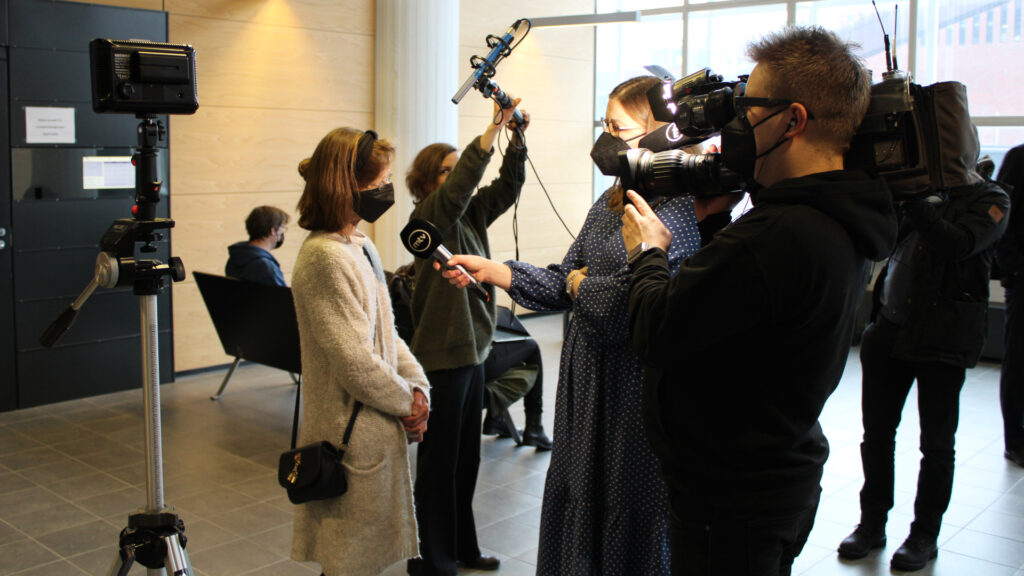
State Prosecutor Anu Mantila is interviewed for MTV3 news.
Bishop Juhana Pohjola commented briefly on the prosecutor’s closing statement:
– “The prosecutor’s primary idea seems to be that, in public, one’s own understanding of the Bible may not be taught, and that freedom of religion does not give one permission to voice aloud a teaching if it is considered to discriminate against a minority group. Therefore, in line with this view, the biblical teachings on marriage, sexuality, sin and grace could not, according to the prosecution, be preached in public. This is an attack on religious freedom.”
The defense denied the charges and criticized the prosecutor.
After the break, it was the turn of the defense lawyers Matti Sankamo (for Dr. Räsänen) and Jyrki Anttinen (for Bishop Pohjola) to make closing statements.
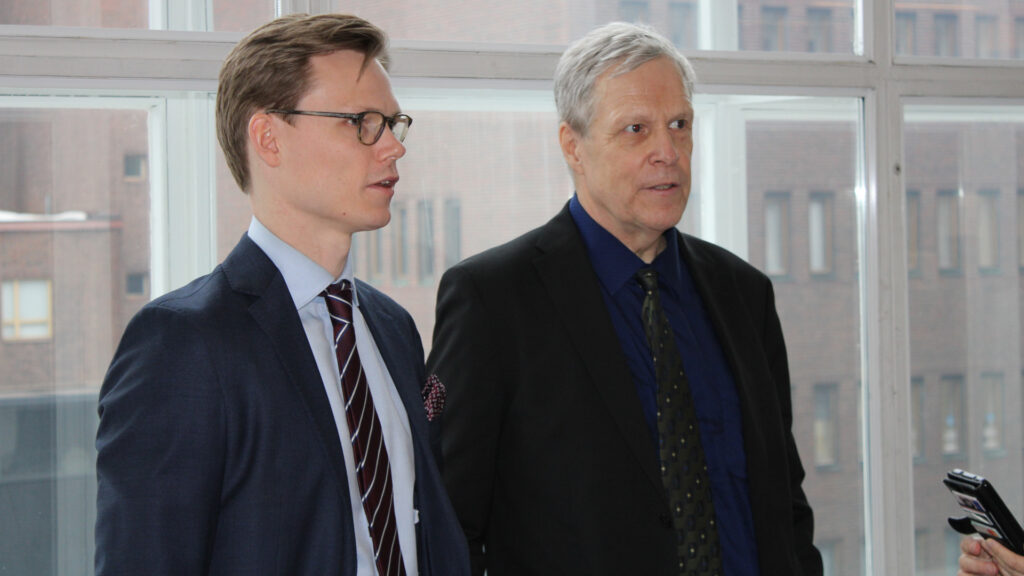
Matti Sankamo and Jyrki Anttinen await the start of the trial.
The defense denied the charges and criticized the prosecution for not presenting grounds for their accusations on the first day of the hearing, but rather concentrating on more general argumentation and biblical-theological deliberation. Since the prosecutors had failed to state the evidence for the charges, that left the defendants with little opportunity to defend themselves against those charges.
In addition, there was also a great difference of opinion as to whether a person’s actions could be separated from their identity. To the prosecution’s arguments that actions and identity cannot be separated, the defense replied that this distinction is an essential part of the Christian concept of humanity and the doctrine of atonement and salvation.
The defense pointed out there was an enormous difference between the specific allegations made by the prosecution in the summons and what was actually said in the booklet, radio show and tweet. Jyrki Anttinen argued as follows:
– “This trial is not about Finnish law versus the defendants’ Bible-based “derogatory viewpoints”, but about the prosecutor’s interpretation of the defendants’ texts. The prosecutors’ ideological-theological framework prevents them from assigning importance to the witness of the booklet and to the defendants’ testimony in court establishing the dignity of every human being and the defendants’ repudiation of denigratory speech against homosexuals. The prosecution’s interpretation seeks to silence and criminalize the teaching of sexual ethics by the defendants and in Christendom. The prosecution’s viewpoint is untenable both before Finnish law and the Word of the Bible.”
The court will issue its decision on 30 March 2022.
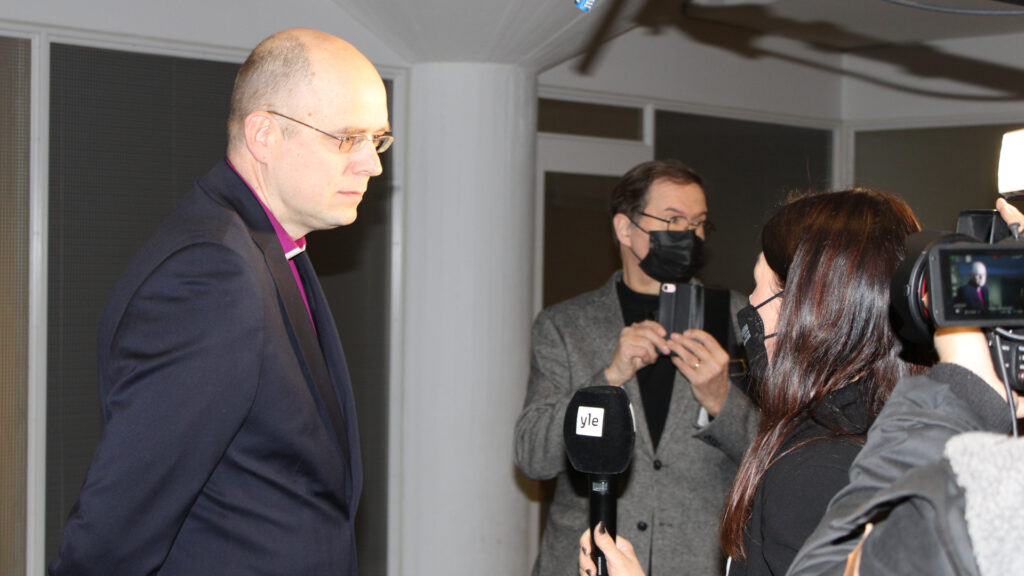
Bishop Juhana Pohjola interviewed for YLE news [Finnish Broadcasting Corp.]
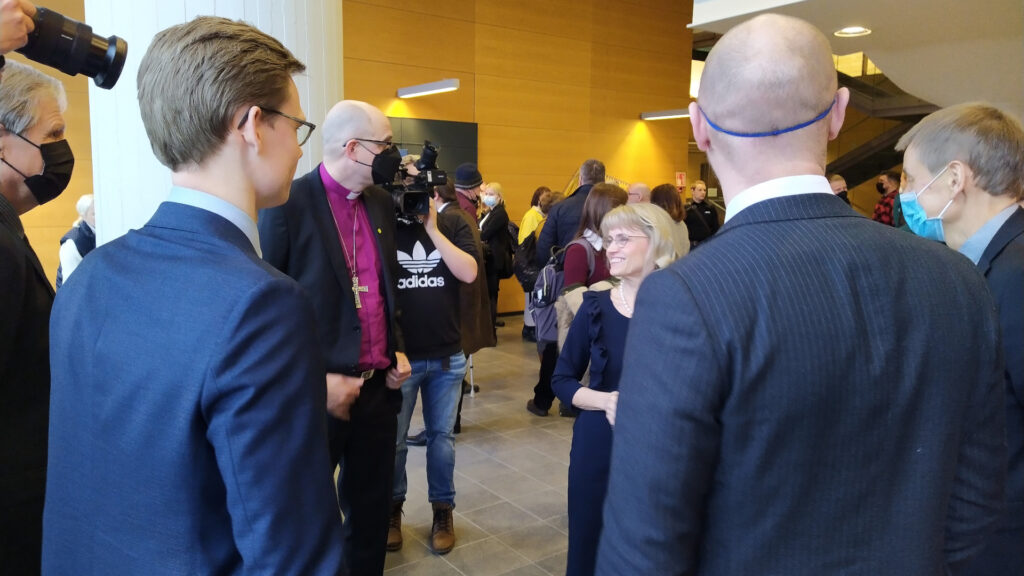
In the foyer of the courtroom, Bishop Juhana Pohjola and Päivi Räsänen, MP, wait for the trial to begin.
On Monday 24 January 2022, the trial against Päivi Räsänen, Member of Parliament, and Bishop Juhana Pohjola started in the Helsinki District Court. The session lasted more than eight hours and included the reading of the charges, the presentation of the case by the prosecution and defense lawyers, the examination of evidence, and finally the hearing of the defendants, Dr. Räsänen and Rev. Dr. Pohjola. The trial will continue with closing statements on 14 February 2022.
Päivi Räsänen, MP, MD, entered the District Court doors with a Bible in her hand. According to her, this event is the “Bible Tribunals”. State Prosecutor Anu Mantila, LLD, in a lengthy presentation of the case, emphasized that what was being dealt with in the courtroom was not the Bible or its interpretation, or theological issues. What was puzzling, however, was that the Prosecutor herself repeatedly returned to theological questions about the Bible, and challenged the defendants concerning these.
– “Under freedom of religion, if you interpret the Bible in a certain way and publish these opinions, it can be a criminal offense,” Dr Mantila stressed.
Päivi Räsänen’s lawyer, Matti Sankamo, LLM, also pointed out that if the court goes on to condemn the Bible, which Päivi Räsänen directly quoted from, then the court would be taking a stand on theology and on biblical interpretation. However, the defense vehemently rejected the idea that the under the pretext of the Bible homosexuals were denigrated and insulted.
– “This is the first criminal case in Finland where the defendant is alleged to have incited against a group of people in a text where s/he explicitly calls out for respect for this minority,” Matti Sankamo argued.
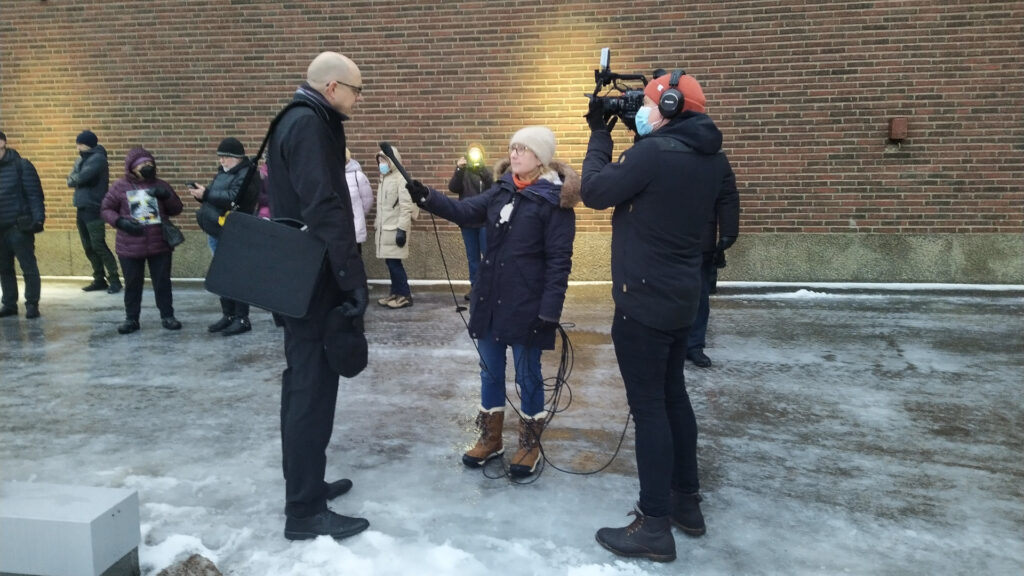
Juhana Pohjola being interviewed before the start of the trial
Bishop Juhana Pohjola says he was surprised by the content of the trial and the arguments of the State Prosecutor. He says that if the arguments put forward by the Prosecutor were to be accepted by the court, it would mean an enormous change in freedom of speech and religion.
– “According to the prosecutor, the Bible can be quoted, but you cannot present your opinions of it if the speech is considered discriminatory. In addition, Dr. Mantila interprets speech which is about sin, brokenness and being against the natural law as derogatory and offensive speech. In the end, the Prosecutor rejects the distinction between the nature, the being, of a person and her/his actions. According to Ms Mantila, the following, which she terms the ‘fundamentalist division’, is unacceptable: ‘God loves the sinner but hates the sin.’ Based on these arguments, our freedom of speech and religion is on the line,” Pohjola stresses.
– “The Bible is not a loose collection of quotations, but it must be recognized, proclaimed and applied in a timely manner from pulpits and in publications, both communally and individually. Talking about sin, shame and unnaturalness does not degrade the dignity of human beings, but on the contrary underscores our worthiness as being responsible for our actions and for our broken relationship with God. On the contrary, it would be spiritual discrimination against a person not to preach to her/him the entire message of God’s judgment of sin and Christ’s gracious forgiveness. It is also necessary to distinguish between the worth of a person and the evaluation of her/his actions. It is inalienable for us to say that God loves the sinner, even though He does not approve of sin, which destroys humankind.
Instructional booklet read eagerly
Because of the trial, the pamphlet Male and Female He Created Them [link], put on display in the courtroom, has become very popular. The 2004 edition has long been out of print, but an electronic version has been made available as a downloadable pdf-document, first on the Luther Foundation Finland website and later on that of the Evangelical Lutheran Mission Diocese of Finland.
The trial also led to a separate news article on the booklet, to make the text more accessible to readers who do not wish to download it separately. Diocesan Secretary Sami Niemi, who acts as editorial secretary for the diocesan website, is surprised by the popularity of the article.
– “The number of downloads is very high, with the Finnish version of the booklet being accessed more than 8,000 times and the English one more than 2,400 times. The booklet’s pdf-document has also been downloaded almost 2,000 times – during the last week. The trial actually brought into the public eye a small and relatively minor portion of our Church’s educational material. My hope is that at least some viewers found the remainder of our teaching materials, such as the 9,000 or so sermon podcasts, or the biblical teachings on our instructional website, luterilainen.net.
This trial has long been the subject of interest in the Christian media abroad. CNE News, CBN, Christian Today, Christianity Today , Evangelical Focus, LCMS Reporter have closely followed the indictment and trial. Concerns about the curtailment of the freedom of religion and expression are also widely shared by various Churches and Christian organizations.
In the wake of the trial, the major mainstream news outlets BBC, Reuters, Euronews, Independent, The Federalist and Daily Wire took up the issue in their newsfeeds.
This case continues to garner support among US Senators.
The International Lutheran Council and many of its member Churches have taken note of the trial and called on their congregations to remember the situation in prayer.
– “We are grateful for the support of our sister Churches and want to thank all intercessors at home as well. The trial is still ongoing, so we ask that Christians in Finland and around the world remember the trial in prayer – in the future as well,” Bishop Juhana Pohjola requests.

Bishop Juhana Pohjola at the door of Helsinki District Court
The trial against Dr. Päivi Räsänen, Member of Parliament, and Bishop Juhana Pohjola, ThD, started today 24 January 2022 at 9:30 am in Helsinki District Court. The case has attracted widespread interest in the Finnish and foreign media.This was reflected in the sizable presence of media representatives when the defendants arrived at the District Court. The Association for the Freedom of Speech and Religion also organized a demonstration of support for Dr. Räsänen and Rev. Dr. Pohjola outside the courthouse.
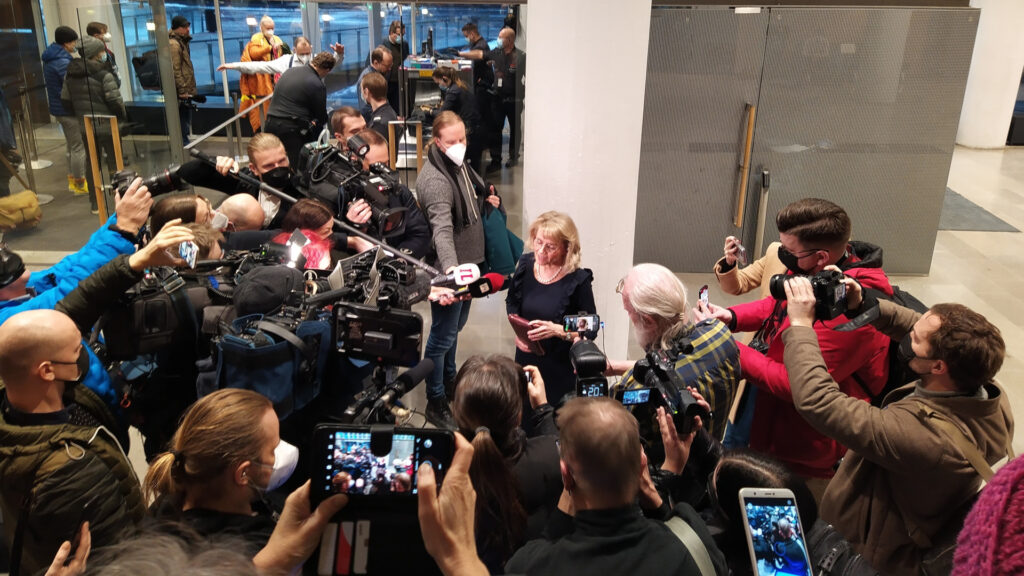
Päivi Räsänen interviewed by the media
Maija Päivinen, District Prosecutor, read out the charges against Päivi Räsänen and Juhana Pohjola for incitement against a group of people. According to the prosecutor, Bishop Pohjola, by publishing the booklet Male and Female He Created Them – Homosexual relationships challenge the Christian concept of humanity [link] has made and kept available to the public an opinion that defames homosexuals as a group, because of their sexual orientation. According to the prosecutor, certain statements are discriminatory and exceed the limits of freedom of speech and religion.
In the indictment, Maija Päivinen, District Prosecutor, demanded that certain passages be removed from the publication and that Räsänen be fined a victim surcharge of at least 120 per diems and Pohjola of 60 per diems. In addition, the prosecutor demanded a corporate fine of a minimum of 10,000 euros for the Luther Foundation Finland, because a person belonging to its statutory body or other management, having actual power of decision in the legal person, had been a party to an offence.
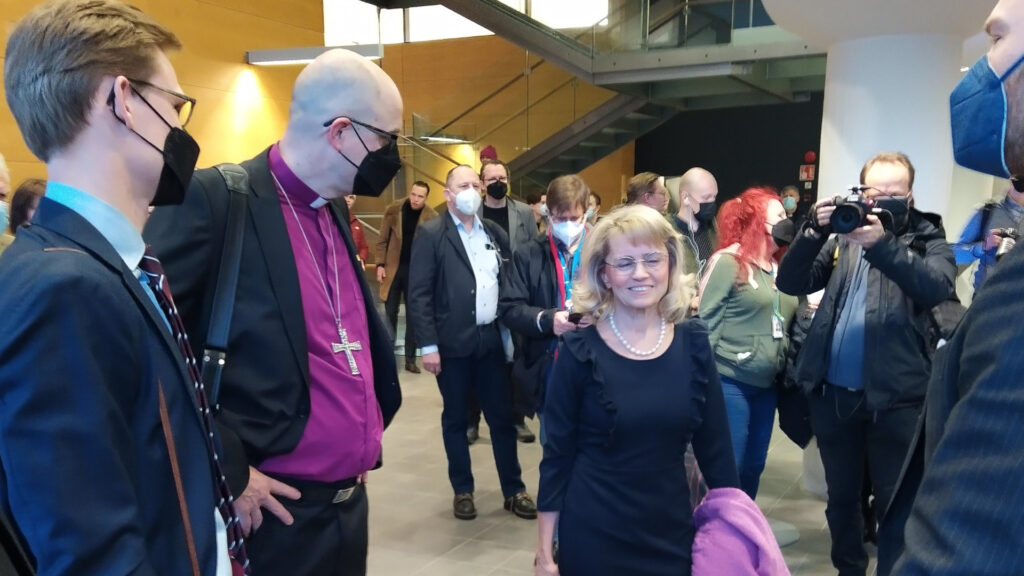
Päivi Räsänen and Juhana Pohjola entering the courtroom
Bishop Pohjola denied in court that he had committed the crime of incitement:
– “I am anxious about attending the first trial against me, but I am also happy that the case will finally be heard. We will be able to defend not only the Word of God, but also the right to freedom of expression. Via the freedom of speech, we do not want to offend or oppress anyone, but to tell of the goodness of God and His will.”
In the case against Päivi Räsänen, Member of Parliament, MD, there are two additional points in the summons. These concern a tweet published in June 2019 and a radio discussion aired in December 2019. In her statement of 20 January 2022, she said:
– “I await the court proceedings with a calm mind. I appeal to the Constitution of Finland and to international conventions that guarantee freedom of speech and religion. I will not back off from my conviction based on the Bible and I am ready to defend freedom of speech and religion in all necessary courts .”
– “In all the charges, I deny any wrongdoing. My writings and statements under investigation are linked to the Bible’s teachings on marriage, living as a man and a woman, as well as the Apostle Paul’s teaching on homosexual acts. The teachings concerning marriage and sexuality in the Bible arise from love of one’s neighbor, not from hate towards a group of people .”
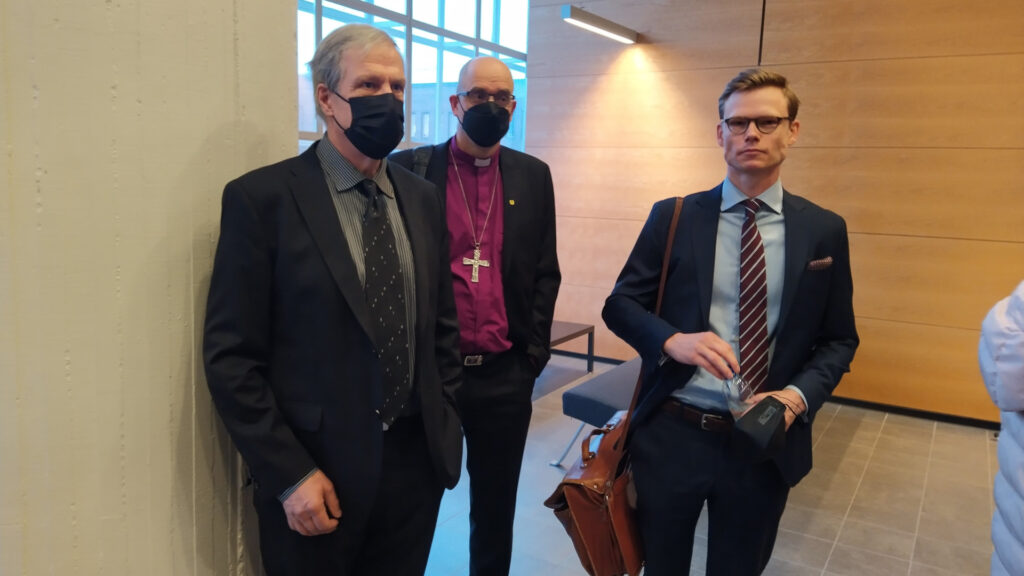
L-R: Jyrki Anttinen, deputy advocate, Bishop Juhana Pohjola, ThD, and Dr. Päivi Räsänen’s legal adviser Matti Sankamo, LL.M., wait for the trial to begin.
According to Bishop Pohjola’s representative, Jyrki Anttinen, deputy advocate, the prosecutor took scripture statements out of context. The prosecutor’s assessment is selective and in no way objective. The text of the booklet has not been interpreted with due regard for the principles of freedom of expression and religion protected by the European Convention on Human Rights and the Finnish Constitution. In the Finnish legal system, ideological and scientific disagreements are not acceptable justifications for restricting freedom of expression.
Rev. Dr. Juhana Pohjola’s preliminary response stated that Räsänen’s writing is in no way threatening, defamatory or insulting. It does not contain any use of pejorative language. It is worth noting that the Christian concept of man, sin and marriage may offend someone as a matter of fact and belief, but the writing itself does not offend and is not intended to offend or degrade anyone’s dignity.
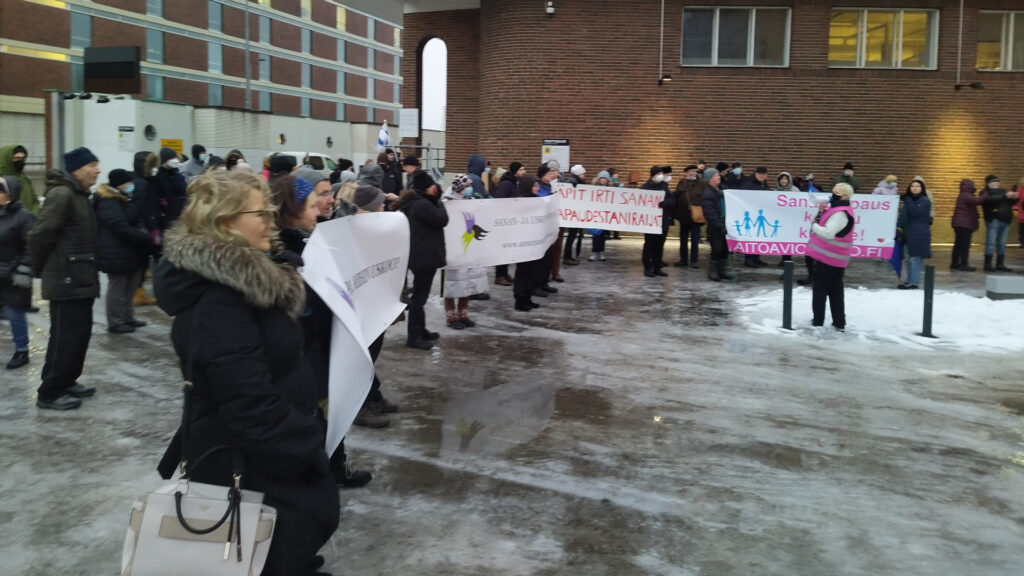
Despite the freezing wind, the demonstration of support attracted a good crowd to Ruoholahti, Helsinki.
A demonstration of support for Päivi Räsänen and Juhana Pohjola was held outside Helsinki District Court before the trial. The purpose of the demonstration was to encourage and support Räsänen and Pohjola, who are accused of promoting the Christian marriage ethic, and of defending freedom of speech and religion in Finland. This was organized by the Association for the Freedom of Speech and Religion. According to the police, there were 85 participants. Many people are concerned about the deteriorating situation of freedom of expression and religion in Finland.
Soili Haverinen, ThD candidate, the organiser of the demonstration, wished to extend her gratitude to all those who came to the demonstration and to those who participated from their homes:
-“Concerns about freedom of religion and freedom of expression clearly unite people from very different backgrounds. It is impossible not to take action in the face of this issue. I could very well be on trial myself now, as I too have brought up very similar issues in public. It is important that all Christians now act together on this, even if there are only two people on trial.”
The three judges of the Helsinki District Court are expected to return their verdict in the coming weeks or months.
Links
Päivi Räsänen, MP, Press Releases of 24 January 2022 and 20 January 2022 [link]
Indictment (dated 29 January 2021) [link]